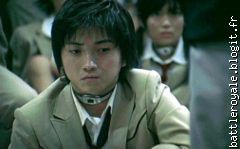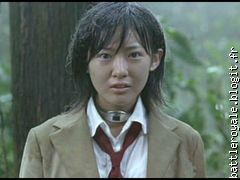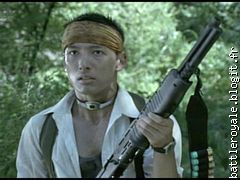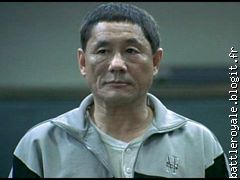battleroyale
The characters
| Shuya nanahara in the movie battle royale. |
The main characters are a 3e class of 42 japanese students and their teacher. But the most important are:
-Shûya Nanahara. Shuya is deeply emotional and somewhat sentimental; he is impulsive and quick to trust people (this particular aspect often proves to be a liability during the course of The Program, nearly resulting in his death several times). He is also very caring, honorable, easy going and likable. It is more than once said it is hard to be sad around him even in sad times. He is a dreamer and an idealist, and never remains silent when he feels anyone around him is being mistreated, regardless of the consequences.
-Noriko Nakagawa Noriko is very timid but during the program( see plot) she prooves herself to be able to act courageously. She is in love with shuya. Even though she is a main character she stays quite mysterious.
-Shôgo Kawada Prior to the events of the film, manga and novel, Shogo Kawada was not the combat-hardened survivalist that he is in the present game. he is quite proficient in first aid, as his father is a doctor, appears to be quite intelligent although slightly unsympathetic.
-Kinpatsu Sakamochi Sakamochi is a vile and sadistic man who likes watching the class die and makes the announcements of dead students. He likes to say things like "I'm proud of you all!" He also seems to be involved in bets over who will win the game (his money is on Kazuo Kiriyama). In the end, Shogo Kawada fatally stabs Sakamochi in the neck with a pencil. Kinpatsu Sakamochi's name is a pun on Kinpachi Sakamoto, the name of the dedicated teacher in the drama series Kinpachi-sensei.
 Commentaires textes : Écrire
Commentaires textes : Écrire
The narrator and the point of view.
 Commentaires textes : Écrire
Commentaires textes : Écrire
Main theme.
Battle royale's main theme is friendship.
Friendship
In battle royale friendship is very important. The students are pushed to kill their friends. Some decide to cheat them; others unite with them despite the fact that there can be only one survivalist.
In this book, the reader can see where friendship starts and where it stops.
In this kind of situation, Should a real friend give his life for another? Or should he forget who his friends are and kill everybody in order to protect his own life?
Koushun Takami puts this relationship into question: who are our real friends? Would they risk their life for us? Would we risk our lives for them? The author tries to remind us that friendship is some kind of alliance, of mutual understanding and that even if something gets into the way (in this case the program) the pact shouldn’t be broken.
 Commentaires textes : Écrire
Commentaires textes : Écrire
The messages.
But the author’s disapproval with the Nazis methods might as well be a criticism of today’s governments. In other words, Mr Takami, by scolding the past regimes, could implicitly find fault with the actual leaderships! The author condemns the ways that the leaders use to keep their population calm (fear, unkept promises, etc). Even if the republic of greater east asia is exaggerated, some aspects resemble the real governments.
One could even go to say that Koushun Takami is trying to tell us that today’s society will loose us. He may mean that our world will soon turn into Battle Royale’s world, with a few big and independent empires ruling with no democracy.
All those potential disparagements owed the book some very controversial reviews.
But apparently, Stephen King agrees that this is a very good book:
« Battle Royale évoque un riff de guitare follement divertissant, mélange improbable du jeu Survivor et d’un match de catch. A moins que Battle Royale ne soit juste complètement fou. »
 Commentaires textes : Écrire
Commentaires textes : Écrire
The style and tone.
« Nanahara lui a bel et bien échappé. C’est sûr…
- Mais alors, pourquoi Shûya ne…
- Parce qu’il se cache peut-être quelque part… Ou alors il s’est perdu.
- Il est peut-être blessé ! Ou pire… »
« C’est bizarre… », dit-il.
« Est-ce que je suis à l’hôtel avec la déléguée de classe ? »
« Ha, ha, c’est bien toi ! Je suis rassurée. Tu as dormi longtemps, tu sais!”
 Commentaires textes : Écrire
Commentaires textes : Écrire






